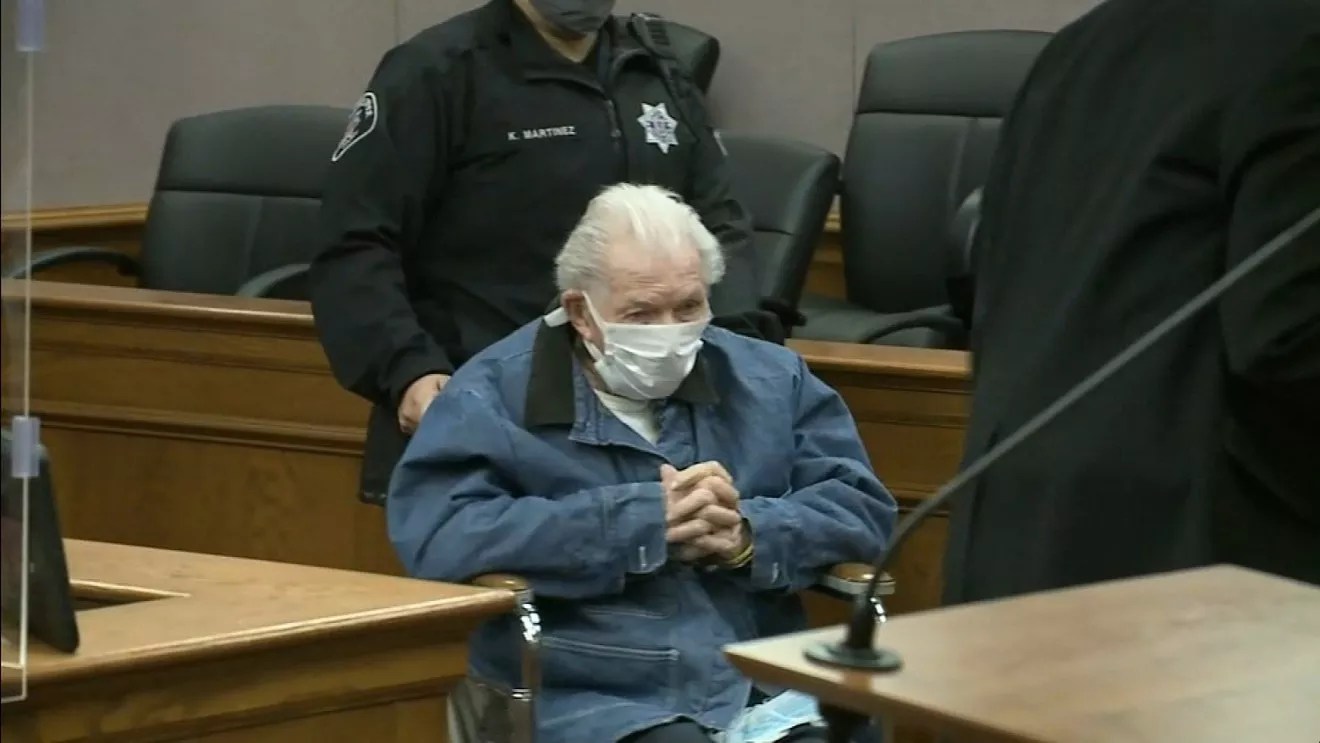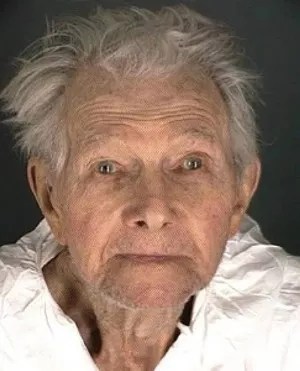
Courtesy of CBS4

Audio By Carbonatix
The office of 20th Judicial District DA Michael Dougherty has formally dropped its prosecution of Okey Payne, who was 95 when he was arrested for the murder of Ricardo Medina-Rojas, a 44-year-old staffer who died just over a year ago at the Lafayette assisted-living facility where the elderly man resided. The now 96-year-old Payne was found incompetent to stand trial last summer, and in the latest filing, Dougherty concedes that this scenario is unlikely to change.
Payne was formally charged with murder on February 10, 2021, and his arrest affidavit stresses that he seemed cogent and in command of his faculties. Nonetheless, the narrative also includes a number of dubious or flat-out bizarre claims, including Payne’s assertions that he was being secretly drugged in his sleep.
The affidavit’s account begins at 7:13 a.m. February 3, 2021, at Legacy Assisted Living, located at 225 Waneka Parkway in Lafayette, where Payne was already in custody for allegedly killing Medina-Rojas with a single gunshot to the head. He was subsequently transported to the police station in Lafayette, where his Miranda rights were written out for him; he’s extremely hard of hearing. According to the document, Payne waived his right to remain silent and elected to speak to investigators.
During the conversation that followed, Payne maintained that staff members at Legacy had been stealing from him since October 2019 – claims that were reportedly investigated and debunked. Nonetheless, he was convinced he was being victimized, and even went to the trouble of writing down the serial numbers of the currency he kept in his wallet.
On the morning of February 2, Payne told officers, he found two $100 bills missing. So the next day, he rose at around 3 a.m., got dressed and headed to the front lobby. When Medina-Rojas, a maintenance worker, arrived for his shift, Payne asked him, “Where’s my $200?” In response, Payne said Medina-Rojas “mumbled something,” after which he pointed the gun at the staffer’s head and fired.
An excerpt from the report: “Okey told me he ‘Blew Ricardo away.’ Okey stated it was too bad he had to ‘waste’ him (Ricardo), but he’s hoping if something good comes from all this is that the stealing will stop.”
Legacy workers had previously told Payne that he couldn’t keep a firearm in his room; he said they placed his .22 caliber rifle and a Beretta handgun inside a storage container that was kept at a separate Boulder facility, but he still had a .45 caliber ACP that dated back to World War I and was a gift from his father that he’d received when he was 23.
Competency is addressed in this passage: “Throughout the hours this affiant spent interviewing Okey, this affiant observed that Okey was clear-headed, lucid, and he provided detailed information regarding this incident. Okey was orientated to date and time and at no point did Okey appear confused or unable to comprehend questions or our conversation. Okey had difficulty hearing, but we were able to communicate through written questions and verbal answers.”

Okey Payne’s booking photo.
Boulder County Sheriff’s Office
Yet a separate section points out that “Okey told this affiant that he thinks the staff at the Legacy are trying to kill him and take all his money. He also believes his ex-wife is working with them to steal his money. Okey told this affiant he has woken up with needle marks in his big toe and he believes the staff are drugging him.”
In the months that followed, Payne was moved to the Colorado Mental Health Institute in Pueblo, and in August, the DA’s office confirmed that staff there had determined that he was not competent to go through the trial process. As a result, Payne’s office put the prosecution on hold until CMHI doctors completed “the process of restoring him to competency.”
Dougherty admits physicians weren’t able to accomplish this goal in a March 29 document with the wordy title “People’s Response to Defendant’s Motion to Dismiss Criminal Proceedings Because Defendant Has a Mental Disability That Rises to the Level of Him Being Incompetent to Proceed and Not Restorable Within the Foreseeable Future Pursuant to C.R.S. 16-8.5-116,” the section of Colorado’s criminal code that pertains to terminating prosecutions.
The doctor treating Payne determined that he suffers from an “unspecified Major Neurocognitive Disorder with psychotic symptoms,” the response notes, and his prognosis was poor because such conditions are “usually irreversible and progressive.” He was said to have “exhibited a lack of understanding of his current charges, the legal process, and also a limited ability to learn and retain new information. In addition, he did not appreciate the seriousness of his charges and the punishment he could face, and his rational decision making skills were influenced by his paranoid delusional thinking.”
Subsequent analyses conducted in October and January 2022 found the situation essentially unchanged. While at the medical center, Payne “has participated in group sessions [and] individual sessions,” but “has refused to take antipsychotic medications, and often refuses other medications…. He has harbored delusional beliefs for nearly four years.” For a younger patient, “the types of delusions Mr. Payne has would likely be related to a mental illness,” the account acknowledges. “However, due to Mr. Payne’s age, the doctors believe that the delusions are caused by neurocognitive illness” that “would not likely respond to medications.”
After all of this was explained to Medina-Rojas’s loved ones, his family members “shared that they had believed this would be the outcome. They are striving to cherish the memories of Mr. Medina-Rojas, rather than focus on the criminal prosecution of the murderer.” Hence, “the People do not oppose the defendant’s motion to dismiss. The defendant committed an unjustified, brutal murder. Given his age, mental condition, and competency status, the People cannot disprove the determinations by the doctors. The defendant should be held in the secured facility at CMHIP for the rest of his natural life.”
This development doesn’t qualify as a surprise: Westword‘s first post about the arrest was headlined, “Why Okey Payne, 95, Is Unlikely to Stand Trial for Alleged Murder.” The piece confirmed that Payne was the oldest person in Colorado to be busted for a homicide in many years, as well as one of the oldest in the country to face such an accusation; the odds that Payne would be convicted and serve time for the act were minuscule.
There is no central repository of information about the oldest people arrested for murder in the United States. But Westword found multiple reports regarding elderly individuals taken into custody for such offenses. One of the earliest involved Massachusetts’s Laura Lundquist, who was 98 on September 24, 2009, when she allegedly strangled her nursing-home roommate, 100-year-old Elizabeth Barrow; a plastic bag was found over Barrow’s head. Lundquist suffered from dementia, resulting in a determination that she wasn’t competent to stand trial. Rather than jail, she was assigned to a state psychiatric hospital.
A similar sequence of events occurred in the case of St. Augustine, Florida, resident Amanda Stevenson, who was formally charged with second-degree murder for fatally shooting her nephew, Johnny Rice, on September 25, 2011, when she was 98. In July 2012, a judge found her incompetent to stand trial, and in October 2013, the charge against her was officially dropped.
Likewise, the district attorney in Maplewood, Minnesota, declined to prosecute Kenneth Bowser, 90, after he allegedly killed his son, 65-year-old Larry Bowser, on September 12, 2015. The reason: The elder Bowser suffered from dementia and Alzheimer’s disease. Florida’s Ramona Lund, 86, also evaded prosecution for beating her 89-year-old husband to death with a cane in January 2019; she died shortly after being found incompetent to stand trial and being sent to a state mental hospital.
Not every case involving senior citizens suspected of murder followed this path, however. Bergen County, New Jersey’s Michael Juskin, age 100, took the justice system out of the process on April 6, 2015; authorities said he killed his 88-year-old wife, Rosalia, with an ax while she slept, then committed suicide. And 84-year-old Pang Vang – also from Maplewood, Minnesota – pleaded guilty to murdering his 36-year-old son, Chue Vang, on March 24, 2014. But shortly before he could be sentenced, he died.
A GoFundMe page for Medina-Rojas has raised just shy of $20,000 toward a goal of $50,000. Click to read the Okey Payne arrest affidavit and the people’s response to the defendant’s motion to dismiss.